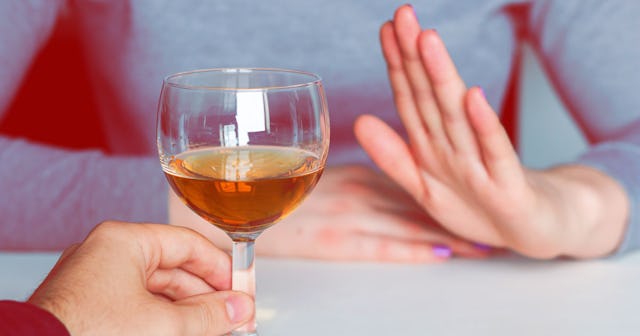As A Gift To My Son, I Stopped Drinking––Here's Why

I have a picture of my son in a yellow tee shirt with a blue glitter seahorse on the front. We are in Maui together for the first time as a family. My son is smiling up at me and holding a sweaty straw-cup full of milk with both of his tiny hands. In the photograph, his curls are plastered against his forehead from the heat, and his cheeks are pink. There is no evidence that minutes earlier he was on the edge of an epic meltdown.
If you have never traveled with a child who is not quite two—getting a free plane ticket under the wire—I will tell you that even when it goes swimmingly, it is exhausting.
The waitress greets us cheerily as I attempt to diffuse the meltdown, fishing around in the bottom of my bag for his orange garbage truck. I barely look up. “Could I have milk in a cup with a straw for him?” I ask, nodding in my son’s direction.
My child starts to shriek about the garbage truck—overtired, overstimulated.
With a laugh, she says, “And you probably need a drink!”
Without a thought, and possessing only marginally more patience than my toddler, I look her in the face and snap, “I don’t drink.”
I don’t say that I have thought about quitting.
I don’t say that I am taking a break.
I don’t say that I have recently stopped.
I say, decisively: “I don’t drink.” It’s the first time I’ve said it to anyone outside my family.
I immediately feel shame and resentment. I feel shame for not being nicer. I feel shame for being the one with the problem. I resent the waitress for making me say the ugly thing out loud.
SDI Productions/Getty
I looked at my son’s face, sitting there in his seahorse t-shirt, clutching his orange garbage truck. Once the cup of milk appeared, and then some fish tacos, he forgot completely about the meltdown, abandoning it like an outgrown toy.
Looking into his sweaty face as he munched on his crispy fish, I could see us across time. It was not that I was not simply not-drinking. I was not just getting sober. I was breaking generational curses, moment to moment.
I haven’t had a drink in 22 days.
I feel like an asshole. For being a jerk to our waitress. For being so angry about my sobriety. For not being able to hold it together.
What I didn’t understand yet, was that I was, in that very moment, evolving my lineage, like a time traveler sent back to save her family. I changed one tiny detail and altered the course of our history.
Rather than closing my eyes and gulping down a cocktail until I could feel my blood chemistry change, I just sat and stared at my son, sweeping curls away from his face. I sat there and endured every little detail.
Before I quit, no one would have thought I had a problem. I kept my drinking nicely zipped up and smoothed out on the surface. I would have a glass of wine with dinner or a couple of cocktails at a party. But inside, I was dying. Not an epic death, like the alcoholics I’d grown up watching in Lifetime movies. Something slower—a spiritual death that was starting to make it hard to look in the mirror or into my son’s face. There is no word for people like me who do not have enough of a problem.
When I quit, there was nothing people could point to where people could excuse their own behavior. Nothing that let them say, “At least I’m not like that.” There is nothing in the popular vernacular for women who are just tired of hurting themselves.
That lack of vocabulary makes people uncomfortable.
Wine mom culture had fooled me into believing that children are not meant to be enjoyed. They are meant to be merely endured, until the socially acceptable hour at which we are allowed to start drinking (heavily, if possible). But I didn’t just want to survive. Which meant that I had some uncomfortable questions.
What if I could actually enjoy my child without numbing myself? What if I could simply be with all of his feelings—even in their most epic meltdowns—without having to numb my own? What if I didn’t treat my life like a problem to be drowned out? What if my child saw me refuse to see him that way?
What might happen?
At that point, my sobriety was a fragile thing, but it grew stronger: less defensive, more certain. Looking out over a sea of drinks dotted with little umbrellas, I still struggled with how unfair this inheritance felt. I looked back at my child and pulled him and his garbage truck into my lap.
Sitting there in his yellow t-shirt, yacht rock barely audible over the cacophony of vacationers, my son was watching me perform witchcraft. I was undoing generations of numbness. I was breaking the spell of seeing children as a burden. I was choosing to stop harming myself and to feel it all.